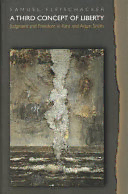
A Third Concept of Liberty: Judgment and Freedom in Kant and Adam Smith PDF
Preview A Third Concept of Liberty: Judgment and Freedom in Kant and Adam Smith
A THIRD CONCEPT OF LIBERTY A THIRD CONCEPT OF LIBERTY JUDGMENT AND FREEDOM IN KANT AND ADAM SMITH SAMUEL FLEISCHACKER PRINCETON UNIVERSITY PRESS PRINCETON, NEW JERSEY Copyright q 1999 by Princeton University Press Published by Princeton University Press, 41 William Street, Princeton, New Jersey 08540 In the United Kingdom: Princeton University Press, Chichester, West Sussex All Rights Reserved Library of Congress Cataloging-in-Publication Data Fleischacker, Samuel. A third concept of liberty : judgment and freedom in Kant and Adam Smith / Samuel Fleischacker. p. cm. Includes bibliographical references and index. eISBN 1-4008-0234-2 1.Kant, Immanuel, 1724–1804—Contributions in political science. 2.Smith, Adam, 1723–1790.3.Liberty.4.Judgment (Ethics) I.Title. JC181.K4F581999323.44—dc2198-30484 This book has been composed in Galliard http://pup.princeton.edu For Noa and Benjamin W H O H AV E TA U G H T M E M O S T O F W H AT I K N O W A B O U T “ S M A L L P L E A S U R E S ” CONTENTS PREFACE ix ABBREVIATIONS xiii CHAPTER 1 Introduction3 PART I: THE NATURE OF JUDGMENT21 CHAPTER 2 Aesthetic Judgment23 CHAPTER 3 Moral Judgment32 CHAPTER 4 Judgment and Freedom64 PART II: THE POLITICS OF JUDGMENT89 CHAPTER 5 Proper Pleasures91 CHAPTER 6 The Wealth of Nations (I): Judgment120 CHAPTER 7 The Wealth of Nations (II): Virtue and Independence140 CHAPTER 8 The Wealth of Nations (III): Helping the Poor161 CHAPTER 9 Kant’s Politics, Rawls’s Politics (I): The Public Use of Judgment184 CHAPTER 10 Kant’s Politics, Rawls’s Politics (II): Talent, Industry, and Luck215 PART III: THE FREEDOM OF JUDGMENT241 CHAPTER 11 A Third Concept of Liberty243 NOTES 279 INDEX 329 PREFACE I N THE FALL OF 1988 I taught a course on eighteenth-century moral sentiment theory that ended with a brief consideration of Adam Smith’s Theory of the Moral Sentiments. I was struck by the way much of it seemed to look forward to Kant and, after teaching Kant’s moral philosophy in the spring of 1989, pursued the possibility of a link between these two thinkers over the summer. To my delight, I discovered both that Kant had in fact read Smith and that this connec- tion had never been made the subject of thorough scholarly study. I de- veloped the connection in an article published by Kant-Studien in 1991. Even before the article was completed, however, I became interested in pursuing the connection between these two thinkers in the opposite direction: what might Kant have had to say about Smith’s economic theories? 1989 was of course an auspicious year to take an interest in the philos- ophy of economics. As the summer moved into fall, I found myself, like many others, riveted less by scholarly work than by the almost daily polit- ical revolutions in Eastern Europe. But scholarly work on Adam Smith seemed about as timely as any such work could be. I agree with those who take the 1989 revolutions to sound the death knell not only of Soviet-style totalitarian politics but of Marxism as a plausible ideology. That need not mean, however, that Marxism’s “antithesis,” dogmatic lib- ertarianism, has won the day. The events of 1989 make clear the need for an alternative to Marxism as a critique of the untrammeled free market. Very important and difficult issues remain about what the state can and should do to alleviate poverty, prevent oppression in the workplace, and guarantee everyone the education and information by which they can make judicious choices. And the debate over such issues needs to be informed, at least in part, by an adequate political philosophy. Contem- porary advocates of the welfare state tend to share an unfortunate com- mitment to utilitarianism—an excessive emphasis on what people want and how to get it to them, as opposed to what they do and how they can carry out their projects with maximum freedom and hope of success. Lib- ertarianism, on the other hand, while claiming to take up precisely the latter attitude, places too much emphasis on the sacredness of property, misconstruing freedom as a matter solely of having rights to act however one likes within one’s “private” realm. There seems consequently to be a need for an approach to political economy that is neither Marxist, nor libertarian, nor excessively utilitarian, and a reconsideration of Adam Smith’s philosophical foundations promises just such an approach. Smith
